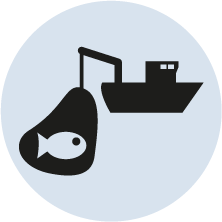What can I do?
Think how you act

Help to protect local habitats and wildlife, also in coastal areas.
Be sure to follow the rules in national parks and nature reserves. Keep to the paths, don’t trample plants and leave animals in peace.
When boating, avoid causing noise and unnecessary waves. Consider establishing a marine protected area.
More reading: Ten ways to protect the Baltic Sea in everyday life (BSAG)
Fish sustainably

Don’t fish for critically endangered species like eels or Baltic Sea cod.
Only catch full-size fish and only take as many as you are going to eat. Please always remember to remove old fishing nets from the water and recycle them properly.
Some of the Baltic Sea’s fish stocks have been endangered by overfishing – and its adverse effects are severe.
More reading: Recreational fishing in the Baltic Sea region (CCB)
Fight climate change

Baltic Sea warms faster than the global average! This impacts all the species living in it.
Reduce your energy consumption by turning the heating down and taking shorter showers, by favoring more ecological means of transport such as trains and other rail traffic, and by opting for other environmental consumer choices in your housing, heating and eating etc.
Other resources
- WWF Fiskguiden (in Swedish) – WWF Fiskeguiden (Danish) – WWF Kalaopas (Finnish)
- Ten ways to protect the Baltic Sea in everyday life (Baltic Sea Action Group)
- How can you help? (WWF)
What is HELCOM doing about it?
The Baltic Sea harbours a unique composition of species and landscapes. An estimated 100 species of fish, 450 species of macroalgae, 1000 zoobenthos species, 3000 plankton species and many thousands of unknown species of bacteria and viruses create the unique underwater biodiversity of the Baltic Sea.
Achieving a good status of biodiversity is a HELCOM priority, strengthened by, among other things, the revised Helsinki Convention in 1992 and the Baltic Sea Action Plan. However, many species are still under threat. It is anticipated that biodiversity will show signs of improvement in the coming years, as the effects of recently implemented measures start to be seen, but continued efforts to improve the environmental status of biodiversity are of key importance.
Further reading:
Baltic Sea knowledge: Biodiversity
HELCOM Action Areas:
